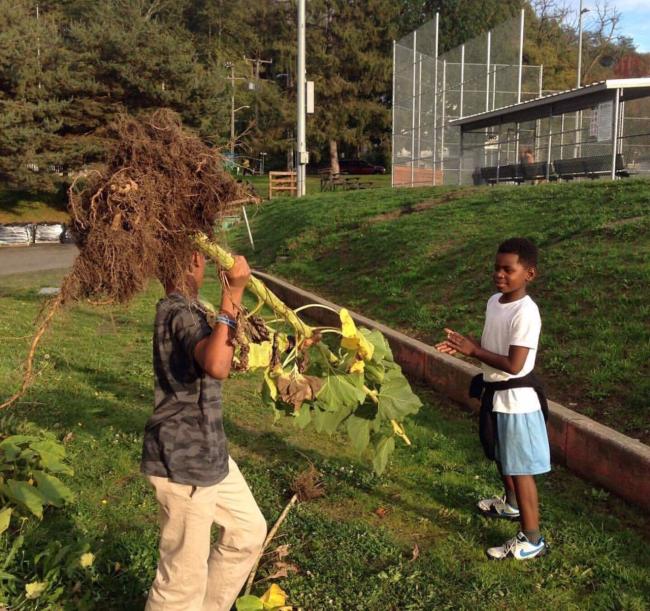Little Red Hen making a big difference in Delridge community
Pulling up a windblown sunflower in October is only part of the work done by volunteers through Little Red Hen.
Sat, 06/17/2017
by Doug Mackar
The Delridge Community in West Seattle was once homesteaded by Portugese fishermen and dock workers in the early 1900’s. Over time, as people with more money moved up to the hilltop, the area became a settlement for blue collar and marginalized members of the community. The Delridge community, located just over the West Seattle bridge off of the Delridge exit, has been historically marginalized to the point that in 2010 the USDA certified the area as a “food desert”.
According to the American Nutrition Association, the USDA defines food deserts as “parts of the country vapid of fresh fruit, vegetable and other healthful whole foods, usually found in impoverished areas. This is largely due to lack of grocery stores, farmers, markets, and healthy food providers.”
Today, the Delridge community has more food options than in the past, and consists of a more diverse range of people, many of whom do not mind having to drive to the closest grocery store farther up the hill. Still, the problem persists, and the solution to this issue goes deeper than simply opening more grocery stores in the area. Over the years, much effort has been put forth to not only provide a greater level of food availability, but in shifting the community towards self-sustainability as well.
“Food should not be available only towards those members of our community with a private vehicle,” says Jenn Dowell, Founder and Executive Director of The Little Red Hen Project. “And food, healthy, sustainable food, should not be so expensive that everyone can’t eat it. Everyone can grow food. And anyone can eat the food that we all grow together. I want you to have the choice to eat healthy.”
The Little Red Hen Project is a local non-profit looking to change the way we feed ourselves and our communities. The LRHP operates a community garden at the Delridge Community Center, where they teach gardening classes to K-12 students. Students can earn service learning hours while learning sustainable, affordable techniques to grow their own food in small, urban settings. And they get to share the literal fruits of their labor come harvest time.
Together with Project Manager Katie Kadwell, Dowell has created a community garden that showcases different ways to grow food, focusing on affordability, small spaces, and nutritional density. Techniques like container gardening, square foot gardening, aquaponics, permaculture and food foresting are at the core of their curriculum. But the learning goes beyond the garden as well.
“The Community Center is equipped with an awesome kitchen,” Dowell says, “and we have volunteers who teach how to make things like pickles and jams and sauerkraut. We have an aspiring chef who teaches you how to use the CSA box that you’ll get for your participation in this garden project.”
The Little Red Hen Project has been active at the Delridge Community Center since 2012, but the roots of the project go deeper.
“Seven years ago, I built my first learning garden at Pathfinder K-8, where my daughter went to school,” Dowell said. “I found a grant from Cedar Grove, which funded the garden if I began a Green Team, a kid’s recycling and conservation program on campus. We called it the Earth Project, and made sure that the Earth Project included garden education.”
Seven years later, the Earth Project at Pathfinder K-8 at Pigeon Point is still a successful learning garden and conservation program, producing young people who care about their environment. After that, Dowell, who works at the West Seattle Nursery and freelances as a landscape designer, formed The Little Red Hen Project, based out of the Delridge Community Center. Several years later Kadwell came on board as project manager and the project continued to bloom.
Since then, the group has been invited to coordinate a learning garden at the Denny International Middle School, as well as acting as a resource for other schools interested in possibly starting learning gardens of their own. They are also a Growing Groceries garden in conjunction with the King County Master Gardeners. Most recently, they have been asked to plan and design an edible garden for the grounds of the American Legion Post 160, at Pershing Hall on Alaska, between 35th and Fauntleroy. Meanwhile, the project at the Community Center continues to grow.
“We are currently in the process of planning and designing an open, free foraging path for the west hillside of the Delridge playground,” Dowell said. “And thanks to a community partnership grant from King Conservation District and the City of Seattle, we are adding a new 1200 square foot learning garden this summer. If you have an interest in permaculture, native ethnobotany, or outdoor art this is a great volunteer opportunity.”
When many people think “community garden,” they imagine a patch of land where individuals pay a fee to have their own private space. According to the LRHP’s website, their garden is different in that it is “planned and organized as an urban farm, rather than individually owned plots.” Community members can take part in the harvest in exchange for volunteer hours.
The project is not only looking for both adults and children interested in participating in their classes, they are also looking for community members who have a gift to share, whether that be canning, pickling, cooking, composting, household budgeting, or any other related topics.
The Little Red Hen Project is fiscally sponsored by Seattle Tilth Alliance. Delridge Community Center is located at 4501 Delridge Way SW.
To learn more, participate in a class, or to volunteer, please visit www.thelittleredhenproject.org or email thelittleredhenproject@gmail.com. You can also find them on Facebook @TheLittleRedHenProject


